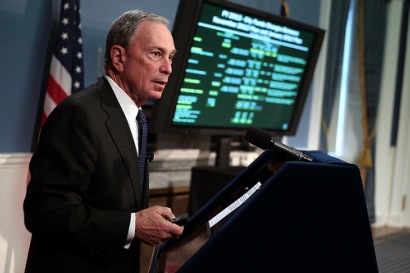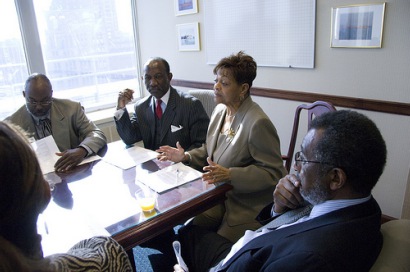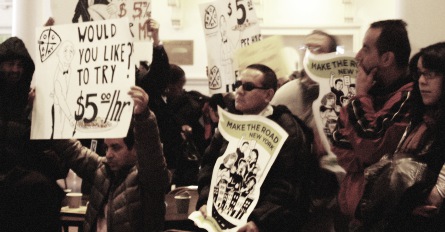Mayor Offers Balanced Budget — But At What Cost?

NEW YORK — Mayor Michael Bloomberg has proposed a $70.1 billion budget, the last of his administration, with no new taxes or layoffs and the costs of the recovery from Hurricane Sandy expected to be repaid by the federal government.
But some experts warned that the preliminary budget announced on Tuesday fails to set aside a sufficient reserve to settle expired labor contracts, which could lead the next mayor to make tough decisions about service cuts and tax increases. They say the budget also makes risky bets on one-shot sources of funding.
The nonprofit Citizens Budget Commission has called the unsettled labor contracts the biggest risk to the budget. "What you are looking at is a potential very, very big hit to the budget," said Maria Doulis, an analyst with the organization.
The Independent Budget Office has said settling the contracts could cost the city billions of dollars.
Overall, the mayor struck a note of growing optimism about the city's financial future, with revenues expected to increase modestly, with Wall Street rebounding and the local economy diversifying.
"We've done a lot," the mayor said. "We've gone through Sandy, we've gone through Irene, we've gone through a mortgage crisis, and yet with all of those things, the city's budget is still in balance."
But fiscal policy experts warned the budget takes risks by relying on the sale of a new class of taxi medallions for additional revenue and a $1 billion drawdown from a health insurance trust fund, which would deplete it. Bloomberg's budget forecasts $600 million in revenue from the medallion sale, which has been frozen after current cab owners sued to stop it.
Observers have long warned that patching up the budget using a one-shot revenue source like the sale of taxi medallions was troublesome.
The IBO also warned in December after the mayor first announced that the city would not be burdened by the cost of Sandy aid "may prove to be a risky assumption."
"The possibility that the city will indeed have to shoulder some of the cleanup and recovery costs — as well as expenditures to mitigate devastation from future storms — remains very real," the IBO said.
The budget estimates $4.5 billion in Sandy-related costs.
In his announcement Tuesday, Bloomberg also said the city stands to lose out on hundreds of millions in state education aid because of the failure to reach an agreement over teacher evaluations with the United Federation of Teachers. The city is already expected to lose $250 million in such aid, which will lead to the loss of 700 teacher positions this year.
He went to Albany on Monday to call on state lawmakers to stave off the loss of state education aid, saying the UFT's demands were untenable and would be "a fraud on the public."
“My message today is simple: Do not punish our schoolchildren for the obstructionism of the UFT. Our children don’t deserve it. They have done nothing wrong," his testimony read. "They just need a quality education to survive in an ever more global and competitive world, and they can only get that with qualified teachers at the front of the room."
The UFT has blamed the mayor for the breakdown in negotiations. "Just as we reached a tentative agreement with the DOE, Mayor Bloomberg scuttled it and once again turned his back on our schools," said UFT President Michael Mulgrew in testimony.
The loss of teacher positions and other proposed cuts to services are expected to be at the center of budget negotiations involving the Bloomberg administration, the City Council, policymakers and advocates.
“This Council is committed to reaching a responsible, balanced budget that protects the vital services New Yorkers depend on," Council Speaker Christine Quinn said in a statement after the mayor's announcement. "We look forward to working with Mayor Bloomberg to ensure that a fair and balanced budget is reached on time and truly meets New Yorkers’ needs."
As expected, soon after the budget was announced, advocates, mayoral candidates and other elected officials began weighing in on the mayor's proposal.
City Comptroller John Liu, who is expected to run for mayor, faulted the Bloomberg administration's "negotiating strategy" on teacher evaluations for losing the badly needed state education funds.
The Campaign For Children, an advocacy organization, said Bloomberg was proposing to roll back the same cuts to after school and other programs that were restored in last year's budget.
Public Advocate Bill de Blasio, who announced Sunday he was running for mayor, tweeted: "Yet again, early ed & after-school programs are on chopping block, upending lives & leaving NYers scrambling. It's no legacy to be proud of."
Another mayor hopeful, Bill Thompson, said the Bloomberg administration had pursued the "wrong fiscal policies."
"Mayor Bloomberg’s failure to work with labor unions and drop cooperation in favor of name-calling and vitriol has been harmful to our city; one need look no further than these budget problems," he wrote in a statement.
The preliminary budget will be followed by an executive budget, a budget negotiation in June, and then an update in the fall.
___
Image by Edward Reed, courtesy of the mayor's office.
Council Passes Bill To Increase City Contracts For Minority Businesses

NEW YORK — Londel Davis' Harlem-based company has contracts to service fire extinguishers with some of the city's largest agencies, including the Department of Education.
But in spite of his success, Davis, who is black, says it's far more common for him and other minority business owners to get rejected when they bid for city contracts. And he says he doesn't really know why that is.
"It might have been our bid was too low," he said. "We might not have had a piece of a document."
The City Council approved a bill yesterday that would revise Local Law 129, passed in 2005, which was supposed to increase opportunities for minority and women-owned businesses to get contracts from the city. Among other enhancements, the new bill would add a greater level of accountability and eliminate a $1 million contract cap.
Local Law 129 had set targets for city agencies to contract minority and women-owned businesses for certain sectors, including construction, architectural and engineering, as well as services and goods.
But the law had been criticized for failing to do its job because of its lack of enforcement and effectiveness. There were also complaints that, because of the $1 million cap, only 15 percent of the billions of dollars worth of city contracts had been subject to the law.
An analysis of the program under Local Law 129 by the mayor's Office of Contract Services this year found that "disparities still exist" between the number of minority and women-owned business enterprises and "the extent to which they are performing city contracting work."
Minority and women-owned business enterprises had about 3.1 percent of the share of eligible city contracts for most of 2012, according to data on the city Comptroller-run site M/WBE Report Card NYC.
In announcing yesterday that the Council would pass Intro 911, the update to Local Law 129, Speaker Christine Quinn said in remarks to the press: "It really became clear, crystal clear, that we needed to do more to ensure that [minority and women-owned business enterprises] got their fair share in the city procurement process."
Michael Bloomberg praised the decision by the Council, strongly suggesting he would sign it into law. "These measures are an important part of diversifying our economy," he said.
Not everyone has been enthusiastic about Intro 911. Some Hispanic business groups were disappointed that it lowers procurement goals for Hispanic-owned construction companies from 9 percent to 4 percent, the Village Voice has reported.
"We're very disappointed with this decision," Frank Garcia, chairman of the New York State Coalition of Hispanic Chambers of Commerce, told the Voice. "We thought that they would at least negotiate with us to give us a higher percentage."
City officials have emphasized that the goals are aspirational, not a quota. The participation goal for blacks in the construction sector was also decreased from 12.63 percent to 8 percent in the new bill.
Besides updating the participation goals, Intro 911 makes a number of revisions and enhancements to Local Law 129, among them the elimination of the $1 million cap and a provision establishing an accountability program, M/WBEStat, modeled loosely after the New York Police Department's method of analyzing crime statistics.
M/WBEStat would require agencies to report their progress toward participation goals to a high-ranking city official.
Davis, who started American Fire Control in 2007 and says his company services 15,000 to 25,000 extinguishers a week, said he was keenly interested in the accountability measure that has been added to the local law through Intro 911 because it adds a level of enforcement that didn't exist before.
He said this could help make the process of bidding for city contracts more fair. "We would all like equal opportunity like everyone else," he said.
___
Image of City Council business breakfast summit, courtesy of the Council.
Advocates Send Thanksgiving Message Calling For Hike In Minimum Wage

NEW YORK — Earlier this week, at the Church of the Holy Apostles in Chelsea, about 50 people waited in line with cafeteria trays to have an early Thanksgiving lunch consisting of an apple, hot sandwich and cider.
As they came to the end of the line, they were asked to sign a card appealing to New York State Senators to pass legislation to raise the minimum wage by $1.25 to $8.25.
It is unclear whether politicians will be listening to the message as they head into the holiday weekend.
Minimum wage was supposed to be on the agenda for a special session of the state Legislature this winter and it was a popular talking point across the state during this month’s elections.
But many lawmakers are now focused on recovery from Hurricane Sandy and prospects for a special session are growing slimmer by the hour. Control of the State Senate is also in chaos and the popular governor, who could push lawmakers into a deal, has waffled on whether a hike in the minimum wage is politically feasible at this time.
In spite of the dimming hopes for minimum wage, activists and spiritual leaders who gathered Monday at the Church of the Holy Apostles, home of the largest emergency soup kitchen in New York City, were undeterred. They had chosen Thanksgiving Week to time the launch of their statewide campaign to call on legislators to pass minimum wage legislation, bringing together activists, spiritual leaders and unemployed New Yorkers.
Mark Dunlea, executive director of Hunger Action, which helped organized Monday’s event at the Manhattan church, said the hurricane was no excuse for putting off a special session or a minimum wage hike.
“We should have a special session and fill a gymnasium in Queens,” Dunlea said, referring to one of the hardest-hit regions in the city. “Get all the legislators down there, have them pass the minimum wage hike and everyone can help out with Occupy Sandy and see what really is going on.”
Sen. Joe Addabbo, who represents some of those hard-hit parts of Queens, said he would like to go back to Albany to do “the people’s work” — including passing legislation to increase the minimum wage.
“The governor can force us to go there, but he can’t force us to do work and that is unfortunate,” he said. “I thought we would be back in Albany and addressing important legislation. The time frame on the minimum wage is flexible. If we had to wait to January and the Democrats are in charge we will pass it then, if it has to wait til January and the Republicans are in the majority we will have to be a loud voice for it. But I really thought we would be back in December to work on this.”
In front of the soup kitchen’s altar, religious leaders, community advocates and unemployed residents gathered around a roundtable, passing a microphone to amplify the message.
The Rev. Raymond Rivera, president of the Latino Pastoral Action Center in Brooklyn, said it would be absurd to increase legislator’s wages while the minimum wage remains at $7.25. “Before you raise your own salaries, first deal with minimum wages,” he said, referring to pay raises for legislators that was also expected to be discussed at a winter special session.
But some business groups and legislators say hiking the minimum wage would kill jobs in the state.
Ken Pokalsky, of the Business Council of New York, said his group thinks a wage hike could cost jobs.
“We estimate the minimum wage hike that has been talked about would cost about $2,900 per job. Our point is: Don't create jobs by increasing cost of labor. If you increase the cost of something, whether it is labor or gasoline, people are going to buy less of it,” he said.
Pokalsky pointed to a 2008 study by Cornell professor Richard Burkhauser that estimated a minimum wage increase in New York would cost 16,000 jobs, and that only 20 percent of the benefits achieved by a hike would go to poor households. “The money comes from somewhere,” Pokalsky said. “Maybe you increase prices, maybe you have fewer jobs at a higher wage, maybe less investment elsewhere or maybe you are making no money.”
A recent study by the office of state Sen. Jeff Klein disputed that notion, finding that a hike would increase wages for over one million workers, generate $600 million in new consumer spending and translate to over 5,000 new full-time jobs.
Business For a Fair Minimum Wage, which counts Costco and the Greater New York Chamber of Commerce among its members, also touts research that says raising the minimum wage does not cause job loss.
Dunlea, meanwhile, has his attention focused on Cuomo, since the governor declared a minimum wage hike was politically dead this summer after the Assembly passed Speaker Sheldon Silver’s bill to increase the minimum wage. The Senate did not take up the measure.
Cuomo has immense political clout and high approval ratings from voters, but even if the governor came out in full support of a hike he would need to get the State Senate to pass the legislation and it isn’t quite clear at the moment who will control the chamber come January.
Cuomo supported a number of Republican Senators but his endorsements were not enough to protect their majority after Democrats picked up at least three seats. Now recounts and backroom deals will decide whether Democrats or Republicans control the chamber.
Senate Democrats have made raising the minimum wage part of their general platform — Mike Gianaris, head of the Senate Democratic Campaign Committee, has touted his conference’s support for a wage hike all year, while Senate Republicans have generally opposed the hike.
“Whether this is addressed in a special session or in January, I believe our candidates won with this across the state,” said Democratic state Sen. Gustavo Rivera, of the Bronx. “But we have to think about the recovery of the state, so I defer to the governor and the people who were hurt by the storm about when it is done. But I believe this is the reason why we need to be in the majority. It is clear we have a mandate. We got more votes than Republicans across the state and we won talking on these issues.”
Senate Majority Leader Dean Skelos called a minimum wage hike a “jobs killer” and said that a hike would hurt small businesses. Meanwhile, news reports indicate that the Independent Democrats have made a hike in the minimum wage part of their platform and will only back a a Majority Leader who intends to bring the measure to a vote. The four legislators are being courted by Republicans and Democrats.
But the political wrangling means very little to those gathered at the Church of Holy Apostles. For some, making any amount of cash is a challenge.
Willard Grant, 30, is from Jamaica, Queens, and has been unemployed for several years and is a regular at the Church of the Holy Apostles soup kitchen. Grant has been living in a Port Washington shelter for six months. “I’m not proud. It’s sad, shameful, and embarrassing but I’m taking things one step at a time,” he said.
He has been moving from shelter to shelter because he doesn’t like being on the streets.
Grant says he lost many friends and family members when he began staying at the shelter but explains he does not like asking people for things or relying on others for money.
Two and a half years ago, he lost his job as a stockboy lifting boxes into Jack’s 99 cent store for minimum wage and needed to work other off-the-book jobs because he said his salary was not enough to pay rent.
Now Grant says he rides his bicycle throughout all five boroughs doing athletic tricks and entertaining moves to keep others in shape. “Sometimes people give me money, but I don’t always like to accept,” he said.
Monday’s event to launch the statewide call for an increase in the minimum wage ended with a prayer from a religious leader asking to “turn the heart of our state legislators” and “hear God’s cries for social and economic justice.”
___
Photo of activists at Church of Holy Apostles by Bridget Woznica.




